高中英语必修三第三单元导学案
人教版新课标必修三 Unit 3 单元导学案
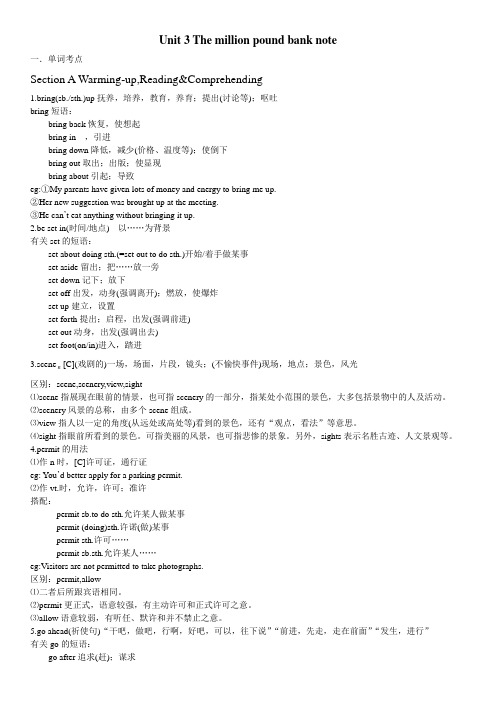
Unit 3 The million pound bank note一.单词考点Section A Warming-up,Reading&Comprehending1.bring(sb./sth.)up抚养,培养,教育,养育;提出(讨论等);呕吐bring短语:bring back恢复,使想起bring in ,引进bring down降低,减少(价格、温度等);使倒下bring out取出;出版;使显现bring about引起;导致eg:①My parents have given lots of money and energy to bring me up.②Her new suggestion was brought up at the meeting.③He can’t eat anything without bringing it up.2.be set in(时间/地点) 以……为背景有关set的短语:set about doing sth.(=set out to do sth.)开始/着手做某事set aside留出;把……放一旁set down记下;放下set off出发,动身(强调离开);燃放,使爆炸set up建立,设置set forth提出;启程,出发(强调前进)set out动身,出发(强调出去)set foot(on/in)进入,踏进[C](戏剧的)一场,场面,片段,镜头;(不愉快事件)现场,地点;景色,风光3.scenen区别:scene,scenery,view,sight⑴scene指展现在眼前的情景,也可指scenery的一部分,指某处小范围的景色,大多包括景物中的人及活动。
⑵scenery风景的总称,由多个scene组成。
⑶view指人以一定的角度(从远处或高处等)看到的景色,还有“观点,看法”等意思。
⑷sight指眼前所看到的景色。
可指美丽的风景,也可指悲惨的景象。
高一英语必修3 unit 3 导学案
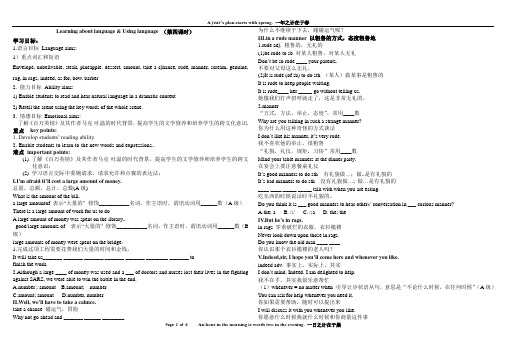
Learning about language & Using language (第四课时)学习目标:1.语言目标Language aims:1)重点词汇和短语Envelope, unbelivable, steak, pineapple. dessert, amount, take a cjhance, rude, manner, scream, genuine, rag, in rags, indeed, as for, bow, barber2. 能力目标Ability aims:1) Enable students to read and hear natural language in a dramatic context2) Retell the scene using the key words of the whole scene.3. 情感目标Emotional aims:了解《百万英镑》及其作者马克·吐温的时代背景,提高学生的文学修养和培养学生的跨文化意识. 重点key points:1. Develop students’ reading ability.2. Enable students to learn to the new words and expressions..难点important points:(1)了解《百万英镑》及其作者马克·吐温的时代背景,提高学生的文学修养和培养学生的跨文化意识;(2) 学习语言交际中委婉请求、请求允许和点餐的表达法;I.I’m afraid it’ll cost a large amount of money.总量,总额,总计,总数(A级)What is the amount of the bill.a large amountof 表示“大量的”修饰___________名词,作主语时,谓语动词用______数(A级)There is a large amount of work for us to doA large amount of money was spent on the library..good/large amounts of 表示“大量的”修饰___________名词,作主语时,谓语动词用______数(B 级)large amounts of money were spent on the bridge.1.完成这项工程需要花费我们大量的时间和金钱。
必修三unit3导学案资料

必修三u n i t 3 导学案课型一:阅读课(warming up, pre-reading, reading andcomprehe nding)课型二:词汇课(Discovering useful words and phrases)课型三:语法课(Discovering useful structure)课型四;语言技能课(Usi ng Ian guage)课型五:写作课(Reading and writing)课型六:测试课课型一:阅读课教学内容Warming up; Pre-reading; Reading;Comprehe nding教学目标1•了解戏剧体裁的特点,学习和理解戏剧语言,尝试表演戏剧,提高文学修养和欣赏水平。
2•学习《百万英镑》的故事,了解马克吐温的生平和他的作品风格,探讨金钱和人性的关系,树立正确的价值观和人生观。
词汇:birthplace; no vel; adve nture; phrase; author; sce ne;wander; pavement; permit; ahead; stare; fault; spot; passage acco unt; seek; con trary; un believable; amount; rude; manner scream; genuine; issue; fake; bow;短语:bring up; make a bet; go ahead; by accident; stare at; acco unt for; on the con trary; take a cha nee; in rags; as for. 自主学习&合作探究自主学习1•阅读该部分内容,了解马克吐温及其作品。
2.让学生交流他们所读过的马克吐温的其他作品。
合作探究Pre-read ing讨论Pre-reading中的问题,在书上给出答案。
2020年新人教版必修三《Unit 3 Diverse Cultures》单元教案(附导学案)1
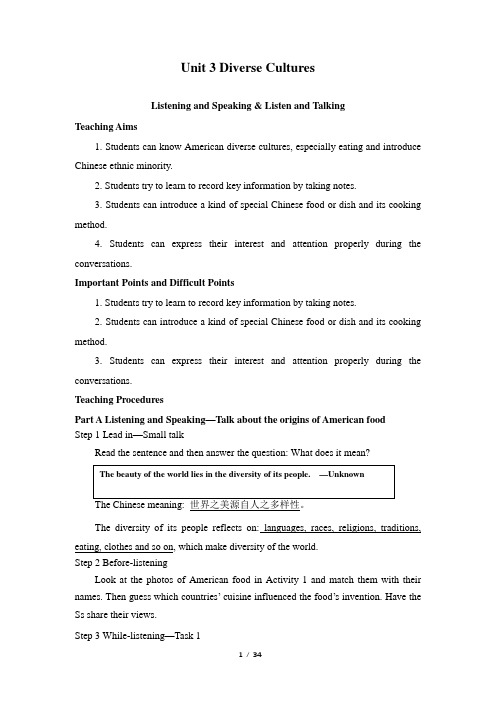
Unit 3 Diverse CulturesListening and Speaking & Listen and TalkingTeaching Aims1. Students can know American diverse cultures, especially eating and introduce Chinese ethnic minority.2. Students try to learn to record key information by taking notes.3. Students can introduce a kind of special Chinese food or dish and its cooking method.4. Students can express their interest and attention properly during the conversations.Important Points and Difficult Points1. Students try to learn to record key information by taking notes.2. Students can introduce a kind of special Chinese food or dish and its cooking method.3. Students can express their interest and attention properly during the conversations.Teaching ProceduresPart A Listening and Speaking—Talk about the origins of American foodStep 1 Lead in—Small talkRead the sentence and then answer the question: What does it mean?The Chinese meaning: 世界之美源自人之多样性。
人教版高中英语必修三第三单元M3 Unit3 reading导学案

M3 Unit3 Diverse CulturesReading: Li Lan’s Travel JournalMotto: Find your beauty, and that of others. Share the beauty, and achieve unity. ——Fei Xiaotong 各美其美,美人之美,美美与共,天下大同。
——费孝通I. Learning aims1.Read a travel journal and know the city of San Francisco.2.Understand and think about how a city had a diverse culture.II. Learning guidance and testsLearning guidance Tests1.Lead-in Where San Francisco lies in the USA? What makes it beautiful and special?_____________________________________________________________________________2.Skimming 1.What is this text about ?A Chinese girl, Li Lan, has taken a trip to , and wrote a .2. Match the main idea with each paragraph.Para.1 A. The author was back in San Francisco again and felt very good.Para.2 B. The author visited a local museum that showed the historical changes in California.Para.3 C. The author made a brief introduction to the Mission District and told us whatshe had done there.Para.4 D. The author is going to a jazz bar tomorrow evening.Para.5 E. The author selected a Cantonese restaurant to have a meal in Chinatown.3.Scanning Choose the best answer according to the passage.( ) 1. Before I came back in San Francisco, I visited______.A. the Golden Gate BridgeB. Napa ValleyC. the Mission DistrictD. Chinatown( ) 2. When did the earthquake happen in the city of San Francisco?A. In 1906.B. In 1848.C. In 1806.D. In 1948.( ) 3. What impressed the writer first about San Francisco?A. The Redwood Forest.B. The wine country.C. The beautiful old buildings.D. The Golden Gate Bridge.( ) 4. What does the author think impressed her most in the Mission District?A. The Mission School.B. The graffiti and comic art.C. The street art.D. The mix of cultures.( )5. Why did Chinese immigrants go to San Francisco at first?A. They wanted to join the gold rush.B. They wanted to open up shops and restaurants.C. They wanted to find jobs on farms.D. They wanted to build the railway.( ) 6. Where did the writer go for dinner?A. A Cantonese restaurant.B. A jazz bar.C. A shop.D. A Mexican restaurant.( ) 7. How did the author feel about tomorrow’s tour?A. Worried.B. Excited.C. Frustrated.D. Surprised.4. Discussion What are the benefits and challenges of cultural diversity?_____________________________________________________________________________III ConsolidationLevel A Summary Today, I arrived back in San Francisco, and it feels good (1)_________ (be) back in the city again. The city succeeded in (2)_________ (rebuild) itself after the earthquake that (3)_________ (occur) in 1906, and I stayed in the Mission District, enjoying some delicious noodles mixed with cultures.In the afternoon, I headed to a local museum (4)_________ showed the historical changes in California. During the gold rush, many Chinese arrived, and some opened up shops and restaurants in Chinatown to earn a (5)_________(live). Many others worked on (6)_________ (farm), joined the gold rush, or went to build the railway that connected California to the east. The museum showed us (7)_________America was built by immigrants from (8)_________(difference) countries and cultures.In the evening, I went to Chinatown, and ate in a Cantonese restaurant that served food on (9)_________(beauty) china plates. Tomorrow evening, I’m going to (10)_________ jazz bar in the Richmond District.Level B 阅读七选五Small talk is a short conversation we have at parties, while we wait in line in a store, at family events or work. Sometimes we make small talk with people we know but not well. Often we have to make small talk with completestrangers. ______. Here are some tips to improve your ability to make small talk._______If you have seen a really good movie or have read a really good book, you can talk about that.When you are sharing the same experience with someone, it’s easy to start a conversation. You simply notice and comment on what ’s going on around you. For example, if you are at a party and a song comes on that you like or that reminds you of something, you can talk about that.Ask open -ended questions.These types of questions require more thought and more than a simple yes or no answer. _______, the conversationwill go on longer.Become a student.Nobody knows everything. So, as someone is answering one of your open -ended questions, they bring up somethingabout which you know nothing. So tell them! This lets the other person become the teacher. _______. It’s a win -winsituation.Like anything, being good at making small talk takes practice._______, you may find it easy. If you make small talkusing English, you will definitely improve your speaking and listening skills.A. Have some conversation starters ready.B. However, some people are not good at small talk.C. If you make small talk in your native language.D. If you ask questions that need more details to answer.E. You can talk about something that you recently learned.F. Many people find these small conversations about random topics easy.G. They feel good about sharing their knowledge and you get to learn something.1 2 3 4 5。
人教课标必修三Unit3 词汇导学案
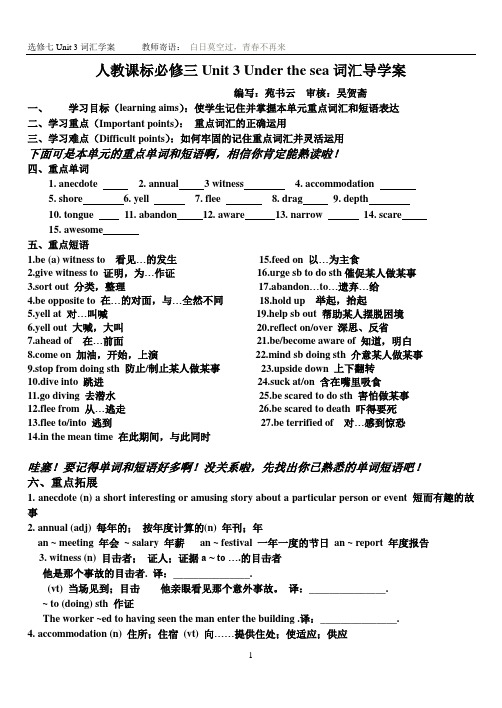
人教课标必修三Unit 3 Under the sea词汇导学案编写:苑书云审核:吴贺斋一、学习目标(learning aims):使学生记住并掌握本单元重点词汇和短语表达二、学习重点(Important points):重点词汇的正确运用三、学习难点(Difficult points):如何牢固的记住重点词汇并灵活运用下面可是本单元的重点单词和短语啊,相信你肯定能熟读啦!四、重点单词1. anecdote2. annual 3 witness 4. accommodation5. shore6. yell7. flee8. drag9. depth10. tongue 11. abandon 12. aware 13. narrow 14. scare15. awesome五、重点短语1.be (a) witness to 看见…的发生15.feed on 以…为主食2.give witness to 证明,为…作证16.urge sb to do sth催促某人做某事3.sort out 分类,整理17.abandon…to…遗弃…给4.be opposite to 在…的对面,与…全然不同18.hold up 举起,抬起5.yell at 对…叫喊19.help sb out 帮助某人摆脱困境6.yell out 大喊,大叫20.reflect on/over 深思、反省7.ahead of 在…前面21.be/become aware of 知道,明白e on 加油,开始,上演22.mind sb doing sth 介意某人做某事9.stop from doing sth 防止/制止某人做某事23.upside down 上下翻转10.dive into 跳进24.suck at/on 含在嘴里吸食11.go diving 去潜水25.be scared to do sth 害怕做某事12.flee from 从…逃走26.be scared to death 吓得要死13.flee to/into 逃到27.be terrified of 对…感到惊恐14.in the mean time 在此期间,与此同时哇塞!要记得单词和短语好多啊!没关系啦,先找出你已熟悉的单词短语吧!六、重点拓展1. anecdote (n) a short interesting or amusing story about a particular person or event 短而有趣的故事2. annual (adj) 每年的;按年度计算的(n) 年刊;年an ~ meeting 年会~ salary 年薪an ~ festival 一年一度的节日an ~ report 年度报告3. witness (n) 目击者;证人;证据a ~ to ….的目击者他是那个事故的目击者. 译:_______________.(vt) 当场见到;目击他亲眼看见那个意外事故。
人教版高中英语必修三Unit3TheMillionPoundBankNoteword导学案3
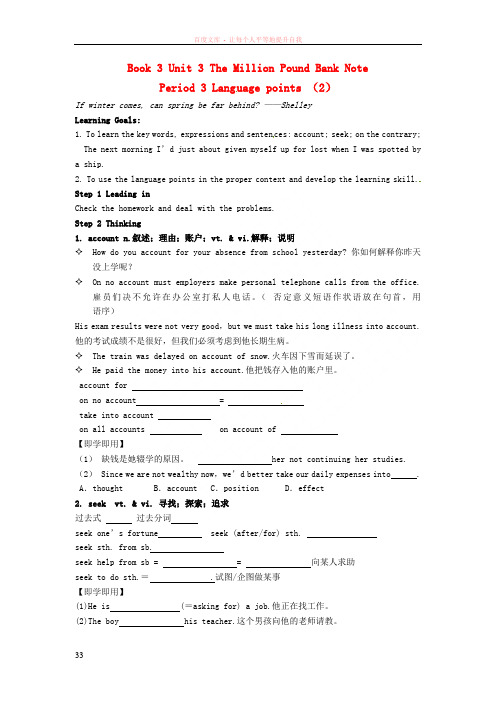
Book 3 Unit 3 The Million Pound Bank NotePeriod 3 Language points (2)If winter comes, can spring be far behind? ——ShelleyLearning Goals:1. To learn the key words, expressions and senten ces: account; seek; on the contrary; The next morning I’d just about given myself up for lost when I was spotted bya ship.2. To use the language points in the proper context and develop the learning skill. Step 1 Leading inCheck the homework and deal with the problems.Step 2 Thinking1. account n.叙述;理由;账户;vt. & vi.解释;说明✧How do you account for your absence from school yesterday? 你如何解释你昨天没上学呢?✧On no account must employers make personal telephone calls from the office.雇员们决不允许在办公室打私人电话。
(否定意义短语作状语放在句首,用语序)His exam results were not very good,but we must take his long illness into account.他的考试成绩不是很好,但我们必须考虑到他长期生病。
✧The train was delayed on account of snow.火车因下雪而延误了。
人教版高中英语必修第3册 Unit3 Reading for writing导学案

3.学习准备:
准备好必修三课本和笔记本。
4.学习方式和环节:
按老师指令完成相应的课上练习,学习环节主要有:
了解学习目标,引入话题进入文本阅读。阅读标题,预测本文的目标读者和作者的写作目的 第一遍阅读,验证预测,找出体现作者写作目的的句子 第二遍阅读回答两个问题,教师提供相应的背景知识第三遍阅读,分析文章的结构和语言特点通过头脑风暴,列出自己的文章的大纲教师向学生提供可用的表达,学生进行写作阅读例文,借鉴其中好的内容和语言,学生再次修改自己的文章。
导学案
1.课题名称:
人教版高一必修三英语——Unit3Reading for writing
2.学习目标:Leabharlann In this class, you will:
1. Acquire the information about Chinatown
2. Analyze the organization and language features of the introduction to the Chinatown
- 1、下载文档前请自行甄别文档内容的完整性,平台不提供额外的编辑、内容补充、找答案等附加服务。
- 2、"仅部分预览"的文档,不可在线预览部分如存在完整性等问题,可反馈申请退款(可完整预览的文档不适用该条件!)。
- 3、如文档侵犯您的权益,请联系客服反馈,我们会尽快为您处理(人工客服工作时间:9:00-18:30)。
子洲三中英语导学案2013-2014学年第1 学期高二年级班姓名编写者高芳使用时间2013年月课题:A taste of English humour课时:period 1学习目标1、通过自学掌握本单元的重点词汇2、掌握文中的重点句子学习方法:信息指引、合作探究自主学习1、根据单词写英标particular contentastonish occasionconvince fortunate2、根据单词写出汉语Performer overcomedirect humourreact explanation3、短语填空对……满足切断挑出直到现在穷的,缺少的_______________ 担任主角_____________________给予…的生活以希望___________________介于两(次世界大战)间的艰难岁月___________________遵守严格的预算______________到某人十几岁时_____________模仿和表演…做…__________ 厌烦去做某事__________________一个社会的失败者____________ 克服所有的困难________________没有获得成功_______________ 在…边缘上__________________做某事很享受________________ 使某人相信某事_____________鼓舞…增强信心_______________ 突然大笑起来 ________________在某个场合下 ________________ 不收取任何额外的费用 ____________交换角色 ________________ 一种特殊的电影制作方法 ________________词性变化1. humour n. 幽默,诙谐humorous adj.幽默的,诙谐的2. fortune n.(大量) 财产,大笔的钱;运气,命运fortunate adj.幸运的,侥幸的fortunately adv.幸运地,幸亏3. bore vt. 使厌烦;n. 令bored adj.感到无趣的或单调boring adj.令人厌烦的,人讨厌的人(或事)的乏味的4. mouth n. 嘴,口mouthful n.一口;少量5. direct adj.直接的;坦率的adv.直接地vt.对准;指导direction n.方向[pl.]说明书;指引;指导director n.指导者,主管;董事;导演6. explain v. 讲解,解释explanation n.解释,说明,阐述【练习】用括号内所提供词的适当形式填空。
1). ________ (fortune), the drowning child was saved.2). He gave a ________ (humor) account of their trip to Spain first.3). Tom went off in one ________ (direct) and Harry in another.4). He now felt ready to take on the role of ________ (direct).5). The earthquake left thousands of people ________ (home).6). I’ m stuffed. I couldn’ t eat another ________ (mouth).7). Not only are mothers not paid but also most of their ________ (bore) or difficultwork is unnoticed.8). There is no convincing ________ (explain) of the overall structure of theuniverse.词语辨析1. specially / especially / particularly【解释】specially = on purpose故意地;专门地 (不是为了别的,而只是为了某一目的而专门采用的某种方式。
如:I came here specially to see you. 我特地到这儿来看你。
especially = particularly = in particular = in especial特别地;尤其是;特别是,通常用来对前面所叙述的事情作进一步说明或补充,是有意突出到显眼或例外的程度,强调“超过其他,与众不同”,在介词或连词前用得较多。
如:I like Harbin, especially in summer.我喜爱哈尔滨,尤其是哈尔滨的夏天。
【练习】用specially,especially,particularly填空。
1). I like my hometown, _______ in spring.2). These shoes were _______ made for you.3). A committee has been _______ appointed to look into the matter.4). We did very well in this exam, _______ our monitor.2. common / usual / ordinary【解释】common意为“普通的,平常的”,指常见的,常发生的,不足为奇的。
usual意为“通常的,习惯性的”,可用于一切频繁发生的事情。
ordinary意为“通常的,普通的,日常的,随时都可以碰到的”,与common意思接近。
【练习】用common,usual,ordinary填空。
1). He arrived later than _______.2). Rabbits and foxes are _______ in Britain.3). Tom Sawyer was a/an _______ American boy who kept getting into trouble.4). Our _______ workday is eight hours.5). He’ s not an officer, but a/an ________ soldier.3. convince / persuade【解释】convince “说服”,着重理智方面的“辩论,证明”。
persuade “说服”,着重情感上的“劝告”或“说服某人做/不做某事”。
【练习】用convince,persuade填空。
1). He _______ me that I should study law.2). He _______ me not to stay.3). The officials were eager to _______ us of the safety of the nuclear reactors.4). I _______ (convince) I saw you there, but it must have been someone else.5). How can we persuade him into _______ (join) us?背景知识介绍查理-卓别林是著名的喜剧大师,他丰富的肢体语言使他在整个默片时代成为备受瞩目的风云人物,也是默片时代的巨星。
他所创造出来的流浪汉夏洛特的形象是家喻户晓,他擅长塑造小人物,通过他们的遭遇来讽刺生活的现实。
他的喜剧不但引人发笑,而且引人深思,有深刻的内涵。
1889年4月16日,卓别林诞生在英国伦敦的一个贫民区。
他的父母都是喜剧演员,经常在伦敦的游艺场里演出。
后来父母离异,生活十分贫苦。
由于过度劳累,母亲染上了喉炎,卓别林五岁那年,母亲在一次演唱时,由于嗓音过于微弱,被观众哄下了舞台。
管事灵机一动,让卓别林代替母亲演出,卓别林故意用沙哑的嗓子学妈妈唱歌,没想到观众却大为欣赏,报以热烈的掌声。
此后,卓别林就开始了他用肢体演出的生涯。
1977年12月25日,喜剧大师卓别林在瑞士科西耶逝世。
课堂导读:1、What do you know about Charlie Chaplin?2、What do you kown about his films?U 3、Use the information in the passage to complete the notes about Charlie Chaplin.Born: job:Famous character :Costume:Type of acting:Died:4、Read the passage again and write down the main idea of each paragraph.Para 1:Para 2:Para 3:Para 4:Para 5:日常口语突破(1)— What do you think of the lecture?你认为那讲座如何呀?— How wonderful. 好极了。
(2)— The party is so fun. 晚会是那么有趣。
— I‘m pleased you are amused at it. 很高兴你被它逗乐了。
作业布置1、找出句中的难句。
2、背诵本单元单词。
